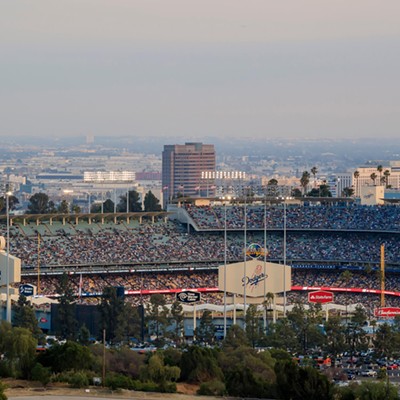UNLIKE ONE OF HIS HEROES, Bobby Kennedy, Tucson author David "Doc" Robertson does not deal in the "what ifs" and the "why nots" of life, although lord knows he's entitled to. The life of Doc Robertson took a tragic turn more than a quarter-century ago when, while playing football for Los Angeles' Crenshaw High, he made a tackle and broke his neck. Paralyzed from the neck down, he spent 11 months in the hospital and has been confined to a motorized wheelchair ever since.
He could have given up and spent the rest of his days feeling sorry for himself, but he chose to take the high road, instead. He entered UCLA and earned his B.A. in English. Then, in a maddening twist, he went to USC and got his Master's in journalism. (This is like attending the University of Arizona and ASU, only on a much smaller scale, since it's only L.A.) While at USC, he wrote, produced and directed a stage play set in Watts and established a student organization called the Equal Opportunity Film Institute, the goal of which was to provide access to the film industry to members of the mostly minority community surrounding USC.
Robertson also regularly wrote articles for the Los Angeles Times on the use of minorities and the disabled in films and produced a series of "Wayland High" books that are read in classrooms around the country. As if his writing chores weren't enough, he began teaching English in the inner city. And then, to fill those last couple hours of free time each month, he coached the basketball team at the charter school where he was teaching. He was so successful as a coach, his efforts got him featured on the NBC Nightly News with Tom Brokaw.
He eventually decided to leave Los Angeles, and that city's loss was Tucson's gain. He got a job teaching honors English at Amphi High School, where he is perennially a student favorite.
Now, Doc Robertson has defied the odds yet again with the release of his novel A Family Tree, Taking Root, a sprawling tale of heartache and achievement set against the often-violent backdrop of inner-city Los Angeles. The book follows one family over several decades, from just before the assassination of John F. Kennedy through the Watts riot and on through to the post-Rodney King city splintered by racism and mistrust.
The book's central character, Roman Robinson, is a young man with many talents but also at least as many roadblocks in his way. Powerfully built, good-looking and cocksure, he approaches his mid-teens with an ease that he feels certain will allow him to negotiate the blind curves of adolescence. He's a stud athlete and all the guys want to be like him, but alas, all the girls want to be with him. All of a sudden, he's got two kids with two different girls before he's 17 and his once-bright football future is clouded.
He begins to drift and is snatched up in the military draft and shipped off to Vietnam. It is only under fire that he sees the possibilities that his life could hold, but he also realizes that it might be too late to take advantage of those things.
His sister Virginia takes an equally circuitous route to adulthood, battling through a variety of obstacles only to suffer setbacks that can be traced to her own stubbornness and suspicious nature. She marries too young, suffers a miscarriage, and then is abruptly widowed.
The brother and sister, Roman and Virginia, having suffered mightily at the hands of their man-hating mother, Simone, and then tossed about in the turbulence of the emerging sexual revolution, are both old by the time they hit their early 20s. But then, they both also hit their respective strides. Each finds fulfillment in his own way, but not without heaping helpings of grief. At times, each achieves an almost idyllic existence, only to have it rent apart by sudden violence or absolutely aggravating shortsightedness on the part of someone in their lives. It is all so uplifting and annoying, hopeful and gut-wrenching--just like real life.
What I liked best is the loving reminiscences of L.A. in the '60s and '70s. Robertson has a great eye and ear for the place back when it had a personality. (Now all it has is personality disorders.) There is a certain echo of Walter Mosley in his writing, which, coming from me, is a high compliment, indeed.
The book could have benefited from somewhat tighter editing, but this is a small complaint. With big family epics like this, being too long is probably better than too short. There are also a few glaringly misspelled words, like when he mentions that mediocre bar band from England, the Beetles. But hey, anybody can make a mistake, especially when it comes to such an obscure reference.
This is a personal book, rendered in a warm and heartfelt manner. It is also a stunning achievement from a man who knows not how to quit.











